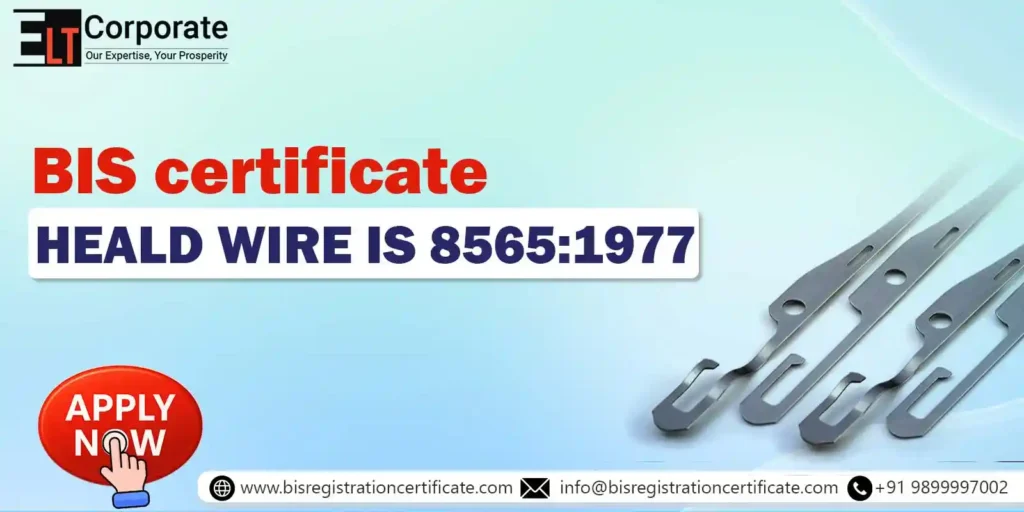The textile industry thrives on accuracy, and is one of the most important components that ensure innocent weaving is a heel wire. This helps to guide the fabric threads on weaving machines, which allows uniform clothes to produce. Since the held wires directly affect the security, durability and safety in textile manufacturing, they should follow the requirements of stringent quality.
In India, these requirements are governed by the Bureau of Indian Standards (BIS) through their certification plan. The BIS certification for the held wire ensures that manufacturers produce components that meet the Indian standards (IS) defined for quality, performance and safety.
This guide will help you understand the importance of BIS Certification For Heald Wire for hand-by-by-step certification process.
What is BIS Certification?
The Bureau of Indian Standards (BIS) is the National Standards Body of India, working under the BIS Act, 2016. BIS Certification – is presented by ISI Mark – it is proof that a product has passed a quality test as per the prescribed standards.
For products such as held wire, BIS certification helps regulate the quality of the market, protect consumers and prevent the circulation of substandard goods in the textile industry.
Read More: Introduction To Bureau Of Indian Standards
Why BIS Certification For Heald Wire Is Essential?
Below we mentioned why BIS certificate for heald wire Is Essential:
- Regulatory Compliance – If the heel wires are included under any quality control order (QCO), the BIS certification becomes mandatory to manufacture, sell or import in India.
- Product Quality Assurance – Certified wires meet Indian standards for durability, tensile power and accuracy.
- Market Trust and Acceptance – Textile manufacturers and machinery manufacturers prefer certified handed wires for reliability.
- Trade Extension – BIS certification improves domestic reliability and export opportunities.
- Legal Protection – It protects businesses from punishment, product recall or rejection by the authorities.
Who requires BIS Certification For Heald Wire?
BIS Certificate For Heald Wire is required by various stakeholders in textile and machinery industry:
- Manufacturers of Held Wire – Domestic producers will have to obtain BIS certification before selling their products in India.
- Importers and traders – Any business importing heel wires in India should ensure BIS certification compliance before customs withdrawal.
- Textile machinery manufacturer – assembling weaving machines often sources held wires; They require certified products to maintain machine efficiency and regulatory compliance.
- Exporters – BS-certain heald wires can use ISI Mark as a proof of quality for international buyers.
- Distributors & Suppliers – textile mills should ensure that they are selling only BIS-identized hand wires to avoid legal punishment.
Applicable Indian Standard (IS) for Heald Wire
The BIS certification for heald wire is typically governed under the IS 8565:1977 – Healds and Heald Frames for Weaving Machines (subject to updates or amendments).
This standard covers:
- Construction and dimensions of heald wire
- Mechanical properties
- Durability requirements
- Testing procedures
Manufacturers must ensure compliance with this standard before applying for certification.
Step-by-Step Process of BIS Certification for Heald Wire
Below we mentioned steps steps to obtain BIS Certificate for Heald Wire
Step 1 – Identify the applied standard: Confirm the relevant code for your product (eg, 8565:1977).
Step 2 – File application: Apply online through BIS portal under ISI Mark Scheme. Submit all necessary details and pay the applicable fee.
Step 3 – Product Test: Send product samples to a BIS-recognized laboratory. The tests are conducted according to the prescribed standard IS.
Step 4 – Factory Audit by BIS: Officers of BIS inspect your manufacturing facility to verify production capacity, test system and quality control processes.
Step 5 – Certification Grant: If products and factory compliance with standards, BIS issues a license, allowing you to stick the ISI mark on the heald wires.
Step 6-Post-Primary Monitoring: BIS conducts periodic inspections and market monitoring to ensure ongoing compliance.
Read More: Process for getting BIS for Certification
Documents Required for BIS Certification for Heald Wire
Below, we mentioned required documents for BIS Certificate for Heald Wire:
- Factory license and layout scheme
- List of manufacturing machinery and test equipment
- Details of raw materials used
- Quality control procedures and manuals
- Sample test report from BIS Lab
- Authorised signers’ ID and company registration documents
- Undertaking of compliance with BIS regulations
Read More: Documents Required For BIS Registration
Benefits of BIS Certification for Heald Wire
Below, we mentioned benefits of BIS Certificate for Heald Wire
- Customer confidence – ISI Mark guarantees reliability for textile manufacturers.
- Competitive edge – Stand separately from unrestrained contestants.
- Export Facility – BIS certification strengthens brand reputation in international markets.
- Legal safety – non-compliance ends the risk of punishment.
- Sustainable Development – Certified products enjoy high acceptance in industries.
Conclusion
For manufacturers and importers of Held Wire, BIS Certification is not just a compliance requirement – this is a mark of quality and trust. With the increasing demand for accuracy in textile machinery, obtaining BIS certification ensures that your product remains competitive and reliable in the market.
If you want to get a BIS certification for heald wire, it is appropriate to consult with compliance experts who can original you can originally guide through the application, testing and approval process.
Why is BIS Certification for Heald Wire required?
BIS certification ensures heald wires meet quality and safety standards for textile machinery.
Who issues BIS Certification for Heald Wire?
The Bureau of Indian Standards (BIS) issues the certification under ISI scheme.
Is BIS Certification mandatory for Heald Wire in India?
Yes, as per BIS regulations, heald wires must be BIS certified before sale or import.









